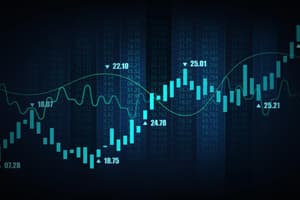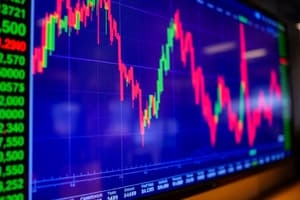Podcast
Questions and Answers
What is the primary goal of trading?
What is the primary goal of trading?
- To create market fluctuations
- To maintain the status quo in the market
- To buy assets at the highest price
- To profit by buying low and selling high (correct)
A limit order is executed immediately at the current market price.
A limit order is executed immediately at the current market price.
False (B)
What type of trading involves buying and selling shares of publicly traded companies?
What type of trading involves buying and selling shares of publicly traded companies?
Stock trading
The balance between buyers and sellers determines the __________ of an asset.
The balance between buyers and sellers determines the __________ of an asset.
Match the following types of trading with their descriptions:
Match the following types of trading with their descriptions:
Flashcards
Trading Profit
Trading Profit
The difference between the price you bought an asset and the price you sell it for. It's calculated by subtracting the purchase price from the selling price.
Supply and Demand in Trading
Supply and Demand in Trading
The price of an asset is determined by the balance between buyers and sellers. When more people want to buy, the price goes up, and vice versa.
Limit Order
Limit Order
An order placed to buy or sell an asset at a specific price or better. This helps control your risk and only execute the trade if the price you want is met.
Market Order
Market Order
Signup and view all the flashcards
Options Trading
Options Trading
Signup and view all the flashcards
Study Notes
Trading Basics
- Trading involves buying and selling assets (stocks, currencies, commodities) on a market.
- The goal is to profit by purchasing low and selling high based on predicted market movement.
- Profit is made when the asset price rises, and losses occur if it falls.
- Supply and demand drive price fluctuations.
Market Dynamics
- Asset prices are determined by buyer and seller interaction.
- Increased buyer demand leads to price increases, and vice-versa.
Brokerage Accounts
- Trading requires a brokerage account with a licensed broker.
- Brokers facilitate transactions on stock exchanges.
Order Types
- Traders place buy or sell orders.
- Market orders are executed immediately at current market prices.
- Limit orders are executed only at specified, or better, prices.
Profit and Loss
- Profit = Selling price - Purchase price.
- Loss occurs when selling at a lower price than buying.
Risk Management
- Crucial to manage trading risks.
- Stop-loss orders limit potential losses if market moves against predictions.
Different Trading Types
- Stock Trading: Buying and selling company shares.
- Forex Trading: Trading currencies.
- Commodity Trading: Buying and selling raw materials (e.g., oil, gold).
- Options Trading: Buying or selling contracts giving the right, but not the obligation, to buy or sell an asset at a specific price.
Studying That Suits You
Use AI to generate personalized quizzes and flashcards to suit your learning preferences.




